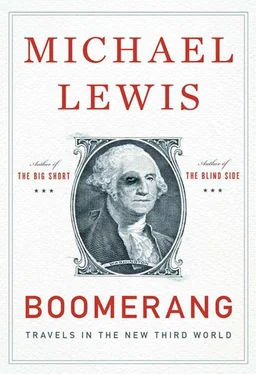That is why Europe’s money problems feel not just problematic but intractable. It’s why Greeks are now mailing bombs to Merkel, and thugs in Berlin are hurling stones through the windows of the Greek consulate. And it’s why European leaders have done nothing but delay the inevitable reckoning, by scrambling every few months to find cash to plug the ever growing holes in Greece, Ireland, and Portugal, and praying that bigger and more alarming holes in Spain, Italy, and even France do not reveal themselves.
Until now the European Central Bank, in Frankfurt, has been the main source of this cash. The ECB was designed to behave with the same discipline as the Bundesbank but has been redesigned by the financial crisis into something else. Already, it has bought, outright, something like $80 billion in Greek and Irish and Portuguese government bonds, and lent another $450 billion or so to various European governments and European banks, accepting virtually any collateral, including Greek government bonds. But the ECB has a rule—and the Germans think the rule very important—that they cannot accept as collateral bonds classified by the U.S. rating agencies as in default. Given that the ECB once had a rule against buying bonds outright in the open market, and another rule against government bailouts, it’s a little odd that they have gotten so hung up on this technicality. But they have. If Greece defaults on its debt, the ECB not only will lose a pile on its holdings of Greek bonds but must return the bonds to the European banks, and the European banks must fork over $450 billion in cash. The ECB itself might face insolvency, which would mean turning for funds to its solvent member governments, led by Germany. (The senior official at the Bundesbank told me they have already thought about how to deal with the request. “We have thirty-four hundred tons of gold,” he said. “We are the only country that has not sold its original allotment [from the late 1940s]. So we are covered to some extent.”)
The bigger problem with a Greek default is that it might well force other European countries and their banks themselves into default. At the very least it would create panic and confusion in the market for both sovereign and bank debt, at a time when a lot of banks and at least two big European debt-ridden countries, Italy and Spain, cannot afford panic and confusion.
At the bottom of this unholy mess, from the point of view of the German Finance Ministry, is the unwillingness, or inability, of the Greeks to change their behavior. That was what the currency union always implied: entire peoples had to change their way of life. Conceived as a tool for integrating Germany with Europe, and preventing the Germans from dominating others, the euro had become the opposite. For better or worse, the Germans now control the financial fate of Europe. If the rest of Europe was to continue to enjoy the benefits of what was essentially a German currency they’d need to become more German. And so, once again, all sorts of people who would rather not think about what it means to be “German” are compelled to do so.
Jörg Asmussen offers the first hint of an answer in his personal behavior. He was a type familiar in Germany but absolutely freakish in Greece or, for that matter, the United States: a keenly intelligent, highly ambitious civil servant who had no other ambition but to serve his country. His sparkling curriculum vitae was missing a line that would be found on the résumés of men in his position almost everywhere else in the world—the line where he leaves government service for Goldman Sachs to cash out. When I asked another prominent German civil servant why he hadn’t taken time out of public service to make his fortune working for some bank, the way every American civil servant who is anywhere near finance seems to want to do, his expression changed to alarm. “But I could never do this,” he said. “It would be illoyal!” Asmussen echoes this sentiment when I ask him why he hasn’t bothered to get rich.
He then addresses the German question more directly. The curious thing about the eruption of cheap and indiscriminate lending of money between 2002 and 2008 was the different effects it had from country to country. Every developed country was subjected to more or less the same temptation, but no two countries responded in precisely the same way. Much of Europe had borrowed money cheaply to buy stuff it couldn’t honestly afford. In effect, lots of non-Germans had used Germany’s credit rating to indulge their material desires. The Germans were the exception. Given the chance to take something for nothing, the German people simply ignored the offer. “There was no credit boom in Germany,” says Asmussen. “Real estate prices were completely flat. There was no borrowing for consumption. Because this behavior is totally unacceptable in Germany. This is what the German people are. This is deeply in German genes. It is perhaps a leftover of the collective memory of the Great Depression and the hyperinflation of the 1920s.” The German government was equally prudent because, he went on, “there is a consensus among the different parties about this: if you’re not adhering to fiscal responsibility you have no chance in elections, because the people are that way.”
In the moment of temptation Germany became something like a mirror image to Iceland and Ireland and Greece—and the United States. Other countries used foreign money to fuel various forms of insanity. The Germans, through their bankers, used their own money to enable foreigners to behave insanely.
This is what makes the German case so peculiar. If they had been merely the only big, developed nation with decent financial morals, they would present one sort of picture, of simple rectitude. But they had done something far less common: during the boom German bankers had gone out of their way to get dirty. They lent money to American subprime borrowers, to Irish real estate barons, to Icelandic banking tycoons, to do things that no German ever would do. The German losses are still being toted up, but at last count they stand at $21 billion in the Icelandic banks, $100 billion in Irish banks, $60 billion in various U.S. subprime-backed bonds, and some yet to be determined amount in Greek bonds. The only financial disaster in the last decade German bankers appear to have missed was investing with Bernie Madoff (perhaps the only advantage to the German financial system of having no Jews). In their own country, however, these seemingly crazed bankers behaved with restraint. The German people did not allow them to behave otherwise. It was another case of clean on the outside, dirty on the inside. The German banks that wanted to get a little dirty needed to go abroad to do it.
About this the deputy finance minister has not that much to say, though he does wonder, idly, how a real estate crisis in Florida ends with massive financial losses in Germany. That such a thing has happened seems genuinely to puzzle him.
A GERMAN ECONOMIST named Henrik Enderlein, who teaches at the Hertie School of Governance in Berlin, has described the radical change that occurred in German banks beginning about 2003. In a paper in progress, Enderlein points out, “Many observers initially believed German banks would be relatively less exposed to the crisis. The contrary turned out to be the case. German banks ended up being among the most affected in continental Europe and this despite relatively favorable economic conditions.” Everyone thought that German bankers were more conservative, and more isolated from the outside world, than, say, the French. And it wasn’t true. “There had never been any innovation in German banking,” says Enderlein. “You gave money to some company, and the company paid you back. They went [virtually overnight] from this to being American. And they weren’t any good at it.”
Читать дальше












